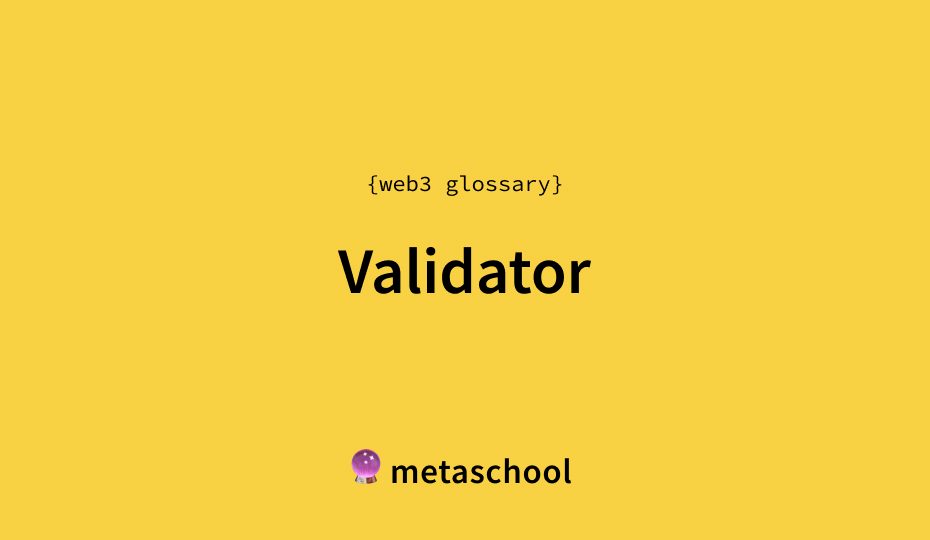Table of Contents
What is a blockchain validator? 📖
A blockchain validator, as the name suggests, is someone who validates transactions on a blockchain. In blockchains such as Ethereum and Polkadot that operate on Proof-of-Stake (PoS) consensus mechanisms, validators (apart from verifying transactions) are also responsible for maintaining the integrity of a blockchain.
In blockchains like Bitcoin that use Proof-of-Work (PoW) consensus mechanism, a validator is known as a miner. The responsibilities more-or-less are the same but a miner is also responsible for adding new transactions to the blockchain.
Differences between a miner and a validator
The major difference that sets a miner and a validator apart is that the former is responsible for adding a transaction to the blockchain as well as verifying it, whereas the latter is responsible for maintaining the integrity of a blockchain while also verifying blockchain transactions.
The table further explains the main differences between both:
| Validator | Miner |
| Mostly works for blockchains that use the PoS consensus mechanism but also supports other mechanisms like Byzantine Fault Tolerance | Mostly works for blockchains that use the PoW consensus mechanism |
| Validators are selected based on their stake in the network – as in the amount of cryptocurrency they have invested | Miners are not selected. Whoever has some knowledge of solving complex mathematical computations and increased computing power can mine |
| Validators charge a transaction fee for each transaction | Miners to get a number of crypto coins with each transaction |
| In the PoS mechanism, validators only maintain the integrity of the blockchain and verify the transactions | In mining, miners are responsible for adding a transaction to a block in a blockchain |
How does a validator maintain the integrity of a blockchain?
Maintaining the integrity of a blockchain is of utmost importance because of two reasons: the number one reason is that blockchains claim themselves to be more secure and safer than centralized systems and fiat currencies, thus they have to be extra cautious, and the second reason is that blockchains include critical data such as financial records, personal information, etc.
If the integrity of a blockchain is compromised, this could lead to errors, inaccuracies, or even fraud. There are a few ways through which a validator maintains the integrity of a blockchain.
- A validator thoroughly verifies a transaction by checking whether it conforms to the rules of the network such as checking if the sender has sufficient funds and the format of the transaction. If there is anything fishy or phony in the transaction, it is rejected right away.
- A validator also ensures that no double-spending – when a user tries to spend a used token again – takes place as that will disrupt the network’s algorithm.
- Additionally, because a validator has a stake in a PoS consensus mechanism, they have extra incentives and risks (losing their stake in case of malicious activity), and they have to be more rigorous and careful with the verification process.
Benefits of becoming a validator
There are numerous benefits of opting to become a validator for the aforementioned networks and they are:
- You get to add to the advancement and betterment of a network by strengthening its security architecture.
- You get to invest your earnings and earn a hefty return on your investment. In the case of mining, you get rewarded for your hard work.
- You build your own unique portfolio and constantly work towards becoming an authority in the crypto world.
- You get to play a major role in the popularity and success of a network/blockchain.
- You expand your horizons and get to learn more about crypto networks, blockchains, and processes every single day.
Blockchains where you can become a validator
In the words of Peter Parker “with great power comes great responsibility”. While being a validator has its own benefits, there are also some risks associated with it.
Risks of becoming a validator
- Albeit not a risk-risk but if a validator defies the rules of a network, tries to counterfeit something, or has their node gone offline for multiple hours, there is a risk of financial losses.
- A new burgeoning market, cryptocurrency is still not legalized in many different countries. Becoming a validator in such a country may lead to legal challenges. For example, in countries like Bangladesh and China where virtual currency is either restricted or banned from the market, people who still use or are associated with cryptocurrency in any capacity are fined and in some cases, even imprisoned. Thus, there may be legal consequences for using cryptocurrency in such countries.
- Stepping into validation as a newbie or as someone with only a small amount of experience may lead to facing challenges on the technical side. You become more prone to making mistakes.
- Trying to find shortcuts or faster ways to attain your objectives (verifying transactions, in this case) may lead to making mistakes unknowingly which can affect your reputation in a negative way.
Risks associated with algorithms other than PoS and PoW
Unfortunately, there are some risks when validators go for an algorithm other than PoS and PoW. These risks range from security constraints, scalability issues (not being able to verify transactions in bulk) to a small number of developers, available resources, and validators to maintain and secure the transactions of a network. Therefore, it is recommended to use an algorithm whose benefits outweigh the risks.
